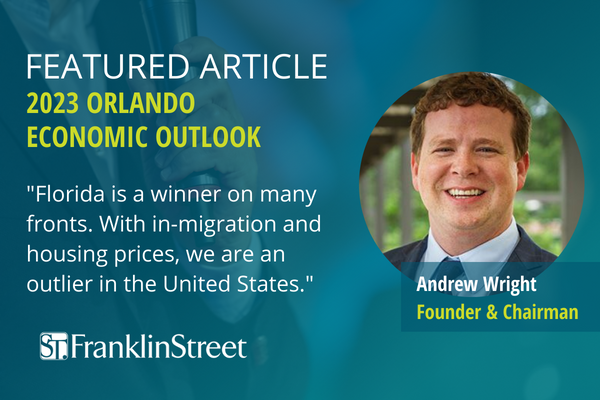Franklin Street was pleased to serve as a presenting sponsor of the Orlando Business Journal’s 2023 Economic Outlook Event! Below are excerpts from OBJ’s recap of the event, featuring key highlights from Franklin Street Founder & Chairman Andrew Wright’s presentation.
The impacts from the unprecedented challenges that the U.S. economy has faced over the last three years will be felt for years to come. The Covid-19 pandemic introduced multiple variables that experts say may lead to a recession. But not all states and communities will feel those impacts equally.
Andrew Wright, Founder and Chairman of Franklin Street, a full-service commercial real estate and insurance firm, joined by Jeffrey Korzenik, who serves as Chief Economist at Fifth Third Commerical Bank, recently shared insights on how the labor market will impact Central Florida’s economy.
The two economic experts came together to share their insights on the Orlando region’s economy during the Orlando Business Journal’s 2023 Economic Outlook on January 17.
…
The good news: Korzenik and Wright agree Central Florida’s economy is expected to face minimal negative impacts from any potential slowing of the economy, highlighting relevant data to help explain the state of our economy and to what extent residents and businesses will be affected.
FIGHTING INFLATION: RISING INTEREST RATES
While the U.S. had historically low [interest] rates until last year, Wright warns that the increases in interest rates by the Federal Reserve have the potential to hurt the economy. While rates remain relatively low, the short-term cost of borrowing has become higher than the long-term cost of borrowing, creating an issue for the real estate markets that must be monitored.
Wright believes interest rates will continue to go up until there is a recession. “We are in a consistent self-made economic crisis that is not going away any time soon,” Wright said. “We are in the thick of it and likely at the breaking point.”
He acknowledges the Fed must act quickly and aggressively, and the only real mechanism available to slow the economy is through interest rates. As a result, we have seen the fastest interest rate increases in history over the last several months.
“While these increases aren’t catastrophic, it’s the rate at which the increases are happening that is concerning,” Wright said. “Markets aren’t set up to respond to raises like this in such a short time.”
INFLATIONARY VARIABLES
A second issue significantly impacting the economy is the supply chain. In the fall of 2021, there was a logistical constrain to goods coming into the U.S.
In the real estate market, Wright points to an increase in the price of steel and concrete, which has remained elevated for several months. He said that, while the costs of material are on a downward trajectory, consumers won’t see the benefits of this until closer to the end of 2023.
“Multi family housing saw some of the highest rent increases in the state,” Wright said. “Orlando experienced this more than Tampa and Jacksonville. There has not been a slow-down in renting.”
…
Another issue impacting inflation has been at the forefront of discussion among Florida legislators – the struggling insurance market. Wright believes it is a major weight on the future of Florida’s real estate market.
“Property losses in Florida continue to push reinsurers out of the market,” Wright says. “Costs and rate of coverage have gone up astronomically as we see some premiums rise more than 100 percent.”
The Florida legislature recently called a special session to make adjustments to the insurance market in hopes of alleviating pressure felt by property owners. But, as of yet, little has been done that will provide relief to homeowner and would-be homebuyers.
INSULATED AGAINST RISK
One reason Florida is in a better position than most states has to do with the in-migration of workers. Wright says that over 655,000 people have moved to Florida since the start of the pandemic and Florida still sees approximately 800 people moving into the state each day.
“We are gaining population,” Wright said. “Florida is a winner on many fronts. With in-migration and housing prices, we are an outlier in the United States. Other states are not as fortunate.”
For Wright, it’s not just simple population growth that helps Florida-it is the type of population growth that is most impactful.
“People are moving from high cost markets such as San Francisco and Chicago and they are bringing their wealth with them,” Wright said. “Florida experienced close to $20 billion in additional earning revenue over the last several years, an unprecedented rate of revenue growth. People moving to Florida are investing in the community and starting businesses. The impact of these new residents won’t be seen for at least five years, but the expectation is that this will have a positive impact on Florida’s economy.”





